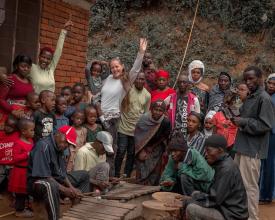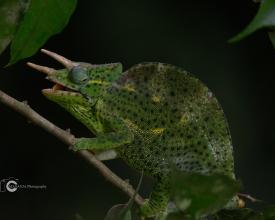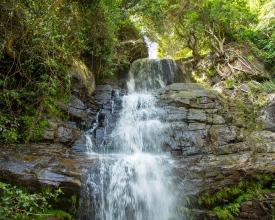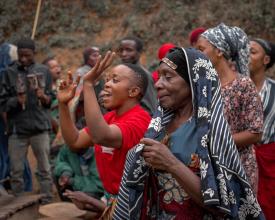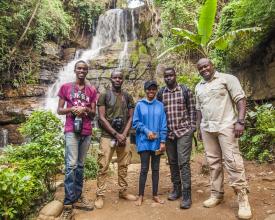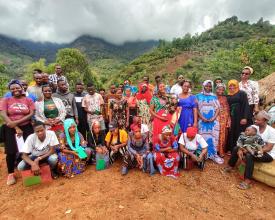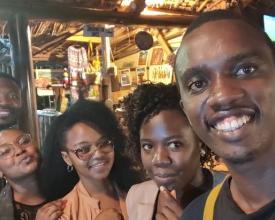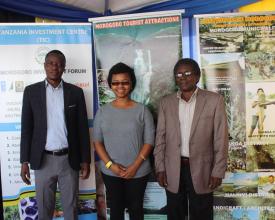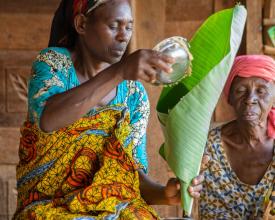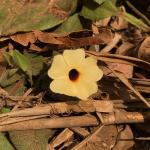
Advocating eco-tourism through art photography
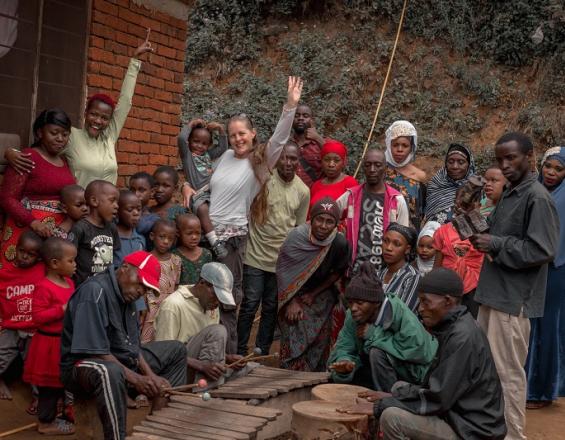
TEG is a youth organization, which focuses on empowering young people living by Nature Reserves through improved livelihood opportunities: eco-tourism and agribusiness.We have worked with communities in the Uluguru Nature forest Reserve in developing ecotourism, using attractions that are naturally found in their culture and tradition.The project has connected beneficiaries with market opportunities, provided capacity building in alternative livelihoods. It has contributed to address challenges, such as the lack of employment and the degradation of the natural environment caused by human activities.We engage professional photographers, who teach photography to young people in the communities, accompany ecotourism expeditions,document the natural environment, as well as the cultural and historical assets of the area.Photographs are curated and form part of regular online exhibitions. They serve to promote eco-tourism activities and valuable tools for raising awareness about conservation.
Context
Challenges addressed
Community-based eco-tourism addresses the lack of employment, the degradation of natural resources and the environment through human activities.
Besides, the government had identified three main challenges for community-based tourism: the lack of infrastructure, poor documentation, and marketing. TEG decided to address the documentation and marketing challenges. With consultation, and meetings including group discussions with communities adjacent to nature reserves we also understood that proper education and supporting materials were an issue limiting communities to strengthen their potential. TEG decided to support the education challenge.
Location
Process
Summary of the process
Team determination is the key to our success as it has helped in managing programs by delivering high quality work with compassion to people and nature. Strong partnerships have contributed financial support and capacity building to our staff and community to implement and design our tourism program. Art photography has been a key method for communicating with online and offline communities, for educating about the importance of conservation and promoting ecotourism in Mkingu nature reserve and Uluguru nature forest reserve.
Building Blocks
Team determination
Our work involves self-motivation and self-financing. TEG team determination to support the conservation of biodiversity and empowerment of youth living adjacent to nature reserves includes organizing online exhibitions and online behaviour change campaigns. With or without external support, TEG staff have volunteerly engaged with donors, government officials, and communities in designing the program, fundraising, and implementing it.
Enabling factors
TEG founders and Alumni internal support in skills development trainings, in conducting baseline surveys and reflections on issues relating to conservation, in connecting with stakeholders, and financing of some of the activities.
Lesson learned
As a youth organization we have been growing by first willing to invest in ourselves, in our credibility and capability before attaching donors and partners. TEG Team and TEG alumni’s determination was our only asset to do that.
Strong Partnership
We established strong partnerships with the Nature Reserves government authorities (Tanzania Forest Service Agency (TFS), as well as with the Department of Natural Resources and Tourism and Youth Development. They provide continuous support, whether it is the use of a vehicle, the delivery of permits, recommendation letters, or waive camping fees to our team and skills.
We also maintain good partnerships with local communities, who propose new activities, and new camping sites to extend the eco-tourism offer and support in installations of sign boards. EAMCEF provided funding $10,000 to support ecological and cultural tourism by empowering the Choma community found adjacent to the Uluguru mountains. Nafasi Art Space provided training in developing art program and fund $1000.
Enabling factors
Report and continuous activities updates sharing with stakeholders.
Lesson learned
Updating about and involving others in our work and cooperating with our partners have improved and shaped positive impact to our communities. For example they have formed an ecotourism group called Choma ecotourism group to manage ecological and cultural tourism development.
Art Photography
We document and promote our work through art photography. Pictures are powerful, as they are visual materials that people can see. They make messages around conservation more impactful among the community members we work with.
We engage professional photographs to join and document expeditions. So far, we have a portfolio of more than 17,342 pictures.
Enabling factors
- Keen to involve artists in supporting conservation work.
- Revisiting our local traditional conservation methods involved working with artists and cultural practitioners.
Lesson learned
- Art and culture is a tool Africans have always used and continue to use to educate wider communities to love their nature.
- Visual art is the best tool to send a message faster and more powerful to communities, especially young people.
- Art and culture reconnect personally to his/her roots.
Impacts
Through Continuous determination of TEG staff and partners we have increased the socio-economic status of adjacent communities through ecotourism initiatives. We provided them with the necessary support such as conservation education, materials like sign boards and skills exchange about promoting tourism. This has, increased online engagement and discussion about the future of ecotourism by securing partnerships with 2 reserves namely Uluguru nature forest reserve and Mkingu nature reserves and Eastern Arc Mountains Conservation Endowment fund (EAMCEF)
More specifically, we have measured the following impacts:
- Secured partnerships with the Eastern Arc Mountains, which support $10,000 in community-based eco-tourism activities.
- Government officials changed their mindset when they saw how photographs can be important for promoting tourism.
- Since the beginning of our activities, more than 273 people visited the Nature Reserves, mostly from Tanzania but also from abroad. The eco-tourism activities have generated more than $ 10,000, through the different activities and services provided by the communities.
- In the Choma community, 35 people are members of the eco-tourism services group and 273 people from the wider community have benefited through farm product selling and transportation providers, out of 400 households and have generated more than $ 10,000 .
Beneficiaries
- Choma ecotourism group around Uluguru mountains
- Local communities in Mlimani ward adjacent to Uluguru nature forest reserve and Mkingu nature reserve.
Sustainable Development Goals
Story
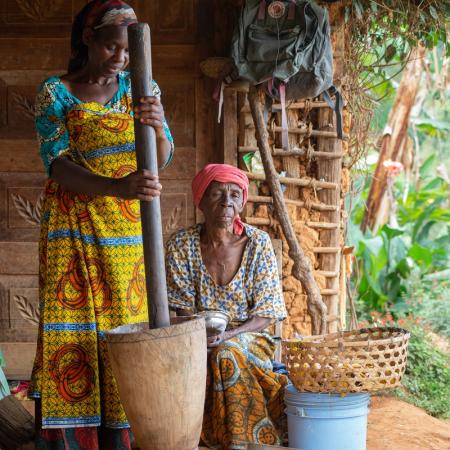
GATE EXHIBITION
Luguru or Waluguru are bantu speaking people living in the Uluguru mountains in Morogoro and coastal plains of east-central Tanzania, made up of 52 tribes. Mazi Residency, situated in Choma village, offers a chance for artists to explore the scenic views of the Uluguru mountains, forests and rich culture of its community.
Davie Masanja, a photographer, was selected for Mazi’s inaugural residency. As part of his residency, he explored a traditional luguru food called “gate” (pronounced “ gah-tey” ) which translates to banana bread. It was famously used as a long-distance travel food by waluguru when they traveled from Morogoro to the Pwani region where they would buy salt. Wrapped in banana leaves, Gate could stay fresh for more than 14 days which earned it another place as a main food during tribal conflicts.
In this exhibition, we explore a body of photos that explains the process of making Gate. The photos were documented in a span of a week where David lived and interacted with the luguru community.
During his stay we visited homestay families’ farms which are organic farms to harvest bananas, cassava and vegetables. The family taught us how to cook Waluguru cuisine. They still practice organic farming to date as a method to protect and preserve their natural motherland.
The experience was organized by Pius Matunge who is a curator and environmentalist dedicated to telling stories of nature and its people. His passion has been conserving the natural forests. Through this he works with artists, nature enthusiastic, cultural organizations and communities adjacent to reserves to tell stories of forests and educate the general public about the importance of art and nature. Pius collaborated with Nafasi Art Space through developing this project with David Masanja as artist.
view exhibition online at https://tengenezageneration.org/mazi/

